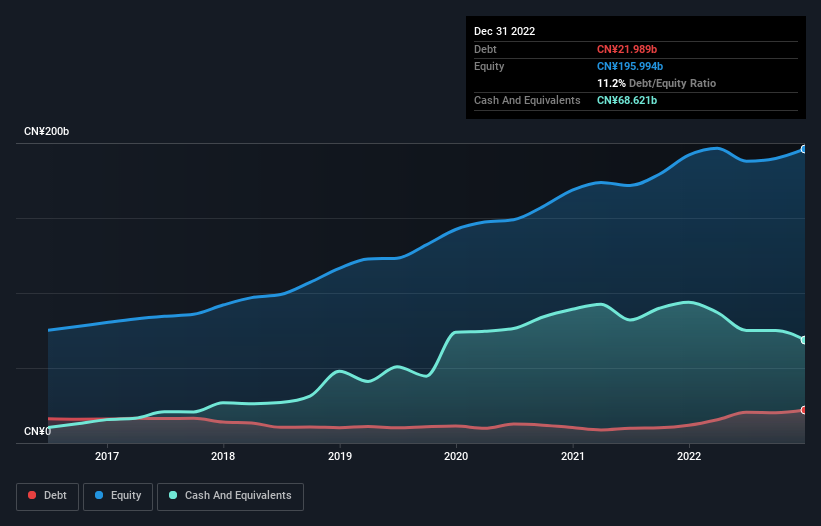
Legendary fund manager Li Lu (who Charlie Munger backed) once said, 'The biggest investment risk is not the volatility of prices, but whether you will suffer a permanent loss of capital.' So it might be obvious that you need to consider debt, when you think about how risky any given stock is, because too much debt can sink a company. We can see that Anhui Conch Cement Company Limited (HKG:914) does use debt in its business. But should shareholders be worried about its use of debt?
When Is Debt A Problem?
Debt assists a business until the business has trouble paying it off, either with new capital or with free cash flow. Ultimately, if the company can't fulfill its legal obligations to repay debt, shareholders could walk away with nothing. However, a more frequent (but still costly) occurrence is where a company must issue shares at bargain-basement prices, permanently diluting shareholders, just to shore up its balance sheet. Of course, the upside of debt is that it often represents cheap capital, especially when it replaces dilution in a company with the ability to reinvest at high rates of return. The first thing to do when considering how much debt a business uses is to look at its cash and debt together.
Check out our latest analysis for Anhui Conch Cement
How Much Debt Does Anhui Conch Cement Carry?
The image below, which you can click on for greater detail, shows that at December 2022 Anhui Conch Cement had debt of CN¥22.0b, up from CN¥11.8b in one year. However, its balance sheet shows it holds CN¥68.6b in cash, so it actually has CN¥46.6b net cash.

How Strong Is Anhui Conch Cement's Balance Sheet?
The latest balance sheet data shows that Anhui Conch Cement had liabilities of CN¥35.6b due within a year, and liabilities of CN¥12.4b falling due after that. On the other hand, it had cash of CN¥68.6b and CN¥20.4b worth of receivables due within a year. So it can boast CN¥41.1b more liquid assets than total liabilities.
This excess liquidity suggests that Anhui Conch Cement is taking a careful approach to debt. Given it has easily adequate short term liquidity, we don't think it will have any issues with its lenders. Simply put, the fact that Anhui Conch Cement has more cash than debt is arguably a good indication that it can manage its debt safely.
In fact Anhui Conch Cement's saving grace is its low debt levels, because its EBIT has tanked 57% in the last twelve months. When it comes to paying off debt, falling earnings are no more useful than sugary sodas are for your health. There's no doubt that we learn most about debt from the balance sheet. But ultimately the future profitability of the business will decide if Anhui Conch Cement can strengthen its balance sheet over time. So if you're focused on the future you can check out this free report showing analyst profit forecasts.
Finally, a business needs free cash flow to pay off debt; accounting profits just don't cut it. Anhui Conch Cement may have net cash on the balance sheet, but it is still interesting to look at how well the business converts its earnings before interest and tax (EBIT) to free cash flow, because that will influence both its need for, and its capacity to manage debt. Looking at the most recent three years, Anhui Conch Cement recorded free cash flow of 27% of its EBIT, which is weaker than we'd expect. That weak cash conversion makes it more difficult to handle indebtedness.
Summing Up
While we empathize with investors who find debt concerning, you should keep in mind that Anhui Conch Cement has net cash of CN¥46.6b, as well as more liquid assets than liabilities. So we don't have any problem with Anhui Conch Cement's use of debt. The balance sheet is clearly the area to focus on when you are analysing debt. However, not all investment risk resides within the balance sheet - far from it. To that end, you should learn about the 3 warning signs we've spotted with Anhui Conch Cement (including 1 which can't be ignored) .
At the end of the day, it's often better to focus on companies that are free from net debt. You can access our special list of such companies (all with a track record of profit growth). It's free.
New: Manage All Your Stock Portfolios in One Place
We've created the ultimate portfolio companion for stock investors, and it's free.
• Connect an unlimited number of Portfolios and see your total in one currency
• Be alerted to new Warning Signs or Risks via email or mobile
• Track the Fair Value of your stocks
Have feedback on this article? Concerned about the content? Get in touch with us directly. Alternatively, email editorial-team (at) simplywallst.com.
This article by Simply Wall St is general in nature. We provide commentary based on historical data and analyst forecasts only using an unbiased methodology and our articles are not intended to be financial advice. It does not constitute a recommendation to buy or sell any stock, and does not take account of your objectives, or your financial situation. We aim to bring you long-term focused analysis driven by fundamental data. Note that our analysis may not factor in the latest price-sensitive company announcements or qualitative material. Simply Wall St has no position in any stocks mentioned.
About SEHK:914
Anhui Conch Cement
Manufactures, sells, and trades in clinker and cement products in China and internationally.
Undervalued with excellent balance sheet and pays a dividend.
Market Insights
Community Narratives



